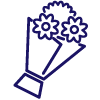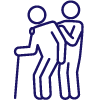- Yokohama-shi Top Page
- Asahi Ward Top Page
- Health, Medical and Welfare
- Welfare and nursing care
- Welfare and Nursing Care for the Elderly
- Efforts on Dementia
- Let's learn about the disease of dementia
Here's the text.
Let's learn about the disease of dementia
Last Updated August 18, 2022
Dementia is a brain disease.
Dementia is a brain disease that anyone can get. Dementia refers to a condition in which brain cells die for various reasons or work poorly, causing various disorders and hindering living (continue for more than 6 months). You. The higher the age, the more likely it is to develop.
It is said that the incidence of the disease increases from the age of 65 and over, and that one in four people develops the disease over the age of 85.
There is also juvenile dementia that occurs in young people under the age of 65. Juvenile dementia refers to those who develop under the age of 64 and are still under the age of 64. Because it develops in the prime of work, it is not possible to do enough work and housework, and it is greatly affected not only the person himself, but also the work and family, causing various problems.
There are various types of dementia.
The brain has a role in each part. There are various parts, such as the part that plays the sensation of seeing and listening, the part that performs the exercise, and the part that carries the memory. There are various types of dementia, depending on where the brain was damaged.
Type of Dementia
Alzheimer's dementia
As a protein called β (beta) amyloid accumulates in the brain over a long period of 20 or 30 years, the function of brain cells is gradually lost and died, the brain is atrophy, and the function is generally reduced.
The progress is slow, but the symptoms vary as the whole brain is atrophy. I have the most common dementia.
Cerebrovascular dementia
It is a dementia in which nutrients and oxygen are not distributed to nerve cells due to cerebral infarction, cerebral hemorrhage, cerebral arteriosclerosis, etc., resulting in the death of nerve cells in that part and the network of nerves is broken. There are two types: those that suddenly develop and progress step-by-step, and those that develop gently and gradually progress. Symptoms vary depending on the part of the damaged brain.
Lewy body type dementia
Dementia that develops when brain cells are damaged by the accumulation of a substance called Leby body in the brain. It is characterized by visionary vision and Parkinson symptoms (slower movement, trembling limbs, stiff muscles, etc.) that can be seen in reality.
Frontal head-type dementia
It is caused by atrophy of the frontal lobe and temporal lobe of the brain, and the age of onset tends to be younger. It is characterized by an increase in anti-social behavior, such as being unable to stand still, getting angry, and taking selfish actions that do not fit on the spot (such as pick disease).
Other
There are various causes of dementia. Vitamin deficiency caused by lack of vitamins and hypoglycemia with too low blood sugar can also cause dementia, and some dementia comes from alcoholism and drug dependence.
In addition, there are dementia that can be diagnosed early, such as chronic subdural hematoma and normal pressure hydrocephaly, and may be cured by appropriate treatment such as surgery. Some diseases, such as depression, can cause symptoms that are likely to be mistaken for dementia.
(Note) Not all people with brain disabilities have dementia.
Source: Yokohama City Dementia Supporter Training Course Text (Edited / Issued NPO Citizen Sector Yokohama Social Welfare Corporation Yokohama City Japan National Council of Social Welfare City of Yokohama, Health and Social Welfare Bureau Elderly Home Support Section)
Juvenile dementia
According to a survey by the Ministry of Health, Labour and Welfare in 2020, the number of patients per 100,000 population is 50.9, which is a relatively rare disease.
About juvenile dementia (to Yokohama-shi page)
What can be done to prevent the progression of dementia
The secret to keeping a healthy brain lies in your daily care.
Reduce the risk of point 1 onset
Alzheimer's disease and cerebrovascular dementia are associated with lifestyle-related diseases (high blood pressure, diabetes, dyslipidemia, etc.). It has been found that daily life management will lead to the prevention of dementia, such as trying to eat abundant vegetables, fruits and seafood, and acquiring regular exercise habits.
Point 2 Activation of the brain
The important thing is to have fun with your family and friends.
● Let's play a role in hobbies, work, home and community.
● Let's take care of each other.
(Example) Go, mahjong, reading aloud, calculation, etc.
Source: Yokohama City Dementia Supporter Training Course Text (Edited / Issued NPO Citizen Sector Yokohama Social Welfare Corporation Yokohama City Japan National Council of Social Welfare City of Yokohama, Health and Social Welfare Bureau Elderly Home Support Section)
There is also such a business in Yokohama.
GoGo Health! -Aiming to be the best health promotion in Japan
Inquiries to this page
Asahi Ward Health and Welfare Center Elderly and Disabled Support Division
Telephone: 045-954-6115
Telephone: 045-954-6115
Fax: 045-955-2675
Email address: as-koreisyogai@city.yokohama.lg.jp
Page ID: 821-598-610












